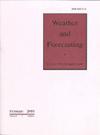Winter Precipitation Type from Microwave Radiometers in New York State Mesonet Profiler Network
IF 3.1
3区 地球科学
Q2 METEOROLOGY & ATMOSPHERIC SCIENCES
引用次数: 0
Abstract
Winter precipitation is a major cause of vehicle accidents, aviation delays, school and business closures, injuries through slips and falls, and adverse health impacts such as cardiac arrests and deaths. However, an improved ability to monitor and predict winter precipitation type (p-type) could significantly reduce and mitigate these adverse impacts. This study presents and evaluates a modified parcel thickness method to derive p-type from a microwave radiometer (MWR) every 10 min. The MWR-retrieved p-types from six selected New York State Mesonet (NYSM) profiler network sites are validated against reference observations from the Meteorological Phenomena Idenfication Near the Ground (mPING) and Automated Surface Observing System (ASOS). Between the two reference observations, the mPING reports are biased toward snow (SN) and sleet (SLT) and away from rain (RA) and freezing rain (FZR) compared to the ASOS. The MWR has the best Pierce skill score (PSS) for RA, followed by SN, FZR, and SLT, and consistently overforecasts FZR and underforecasts SLT compared to both mPING and ASOS. The MWR p-type retrievals are generally found to be in better agreement with ASOS than mPING. Continuous thermodynamic profiles and p-type estimates from across all 17 profiler sites are available at http://www.nysmesonet.org/networks/profiler. Having such thermodynamic information from across the state can be a valuable resource, with a significant advantage over twice daily NWS radiosondes, for monitoring and tracking hazardous winter weather in real time, for accurate forecasting, and for issuing timely warnings and alerts. Accurate prediction and monitoring of winter precipitation type (p-type) is important due to the adverse economic and health impacts posed by winter weather. However, complexities in understanding and modeling the processes that govern p-type and inadequate observational data limit accurate monitoring and prediction. To address these issues, a ground-based microwave radiometer (MWR) that provides thermodynamic profiles up to 10 km every 2 min, as deployed at 17 sites in the New York State Mesonet (NYSM) profiler network, can be a valuable tool. This study evaluates the accuracy of p-type estimates based on the parcel thickness method from the MWR data and its implementation to the NYSM real-time operations.来自纽约州中网剖面仪网络微波辐射计的冬季降水类型
冬季降水是造成交通事故、航空延误、学校和企业关闭、因滑倒和跌倒而受伤以及心脏骤停和死亡等不利健康影响的主要原因。然而,监测和预测冬季降水类型(p型)的能力的提高可以显著减少和减轻这些不利影响。本文提出并评估了一种改进的包层厚度方法,该方法每10分钟从微波辐射计(MWR)中获得p型。MWR从六个选定的纽约州Mesonet (NYSM)剖面仪网络站点检索的p型与来自近地气象现象识别(mPING)和自动地面观测系统(ASOS)的参考观测进行了验证。在两个参考观测之间,与ASOS相比,mPING报告偏向于雪(SN)和雨夹雪(SLT),远离雨(RA)和冻雨(FZR)。MWR在RA的穿刺技能得分(PSS)最高,其次是SN, FZR和SLT,与mPING和ASOS相比,MWR一直高估FZR,低估SLT。与mPING相比,MWR p型检索通常更符合ASOS。来自所有17个剖面站点的连续热力学剖面和p型估计可在http://www.nysmesonet.org/networks/profiler上获得。拥有来自全国各地的热力学信息是一种宝贵的资源,与NWS每天两次的无线电探空仪相比,它具有显著的优势,可以实时监测和跟踪危险的冬季天气,进行准确的预报,并及时发布警告和警报。由于冬季天气对经济和健康造成不利影响,冬季降水类型(p型)的准确预测和监测非常重要。然而,理解和建模控制p型过程的复杂性和观测数据的不足限制了准确的监测和预测。为了解决这些问题,地面微波辐射计(MWR)可以提供每2分钟10公里的热力学剖面,部署在纽约州Mesonet (NYSM)剖面网络的17个站点,可以成为一个有价值的工具。本文对基于包层厚度法的水水堆数据p型估计的精度进行了评价,并将其应用于NYSM实时操作。
本文章由计算机程序翻译,如有差异,请以英文原文为准。
求助全文
约1分钟内获得全文
求助全文
来源期刊

Weather and Forecasting
地学-气象与大气科学
CiteScore
5.20
自引率
17.20%
发文量
131
审稿时长
6-12 weeks
期刊介绍:
Weather and Forecasting (WAF) (ISSN: 0882-8156; eISSN: 1520-0434) publishes research that is relevant to operational forecasting. This includes papers on significant weather events, forecasting techniques, forecast verification, model parameterizations, data assimilation, model ensembles, statistical postprocessing techniques, the transfer of research results to the forecasting community, and the societal use and value of forecasts. The scope of WAF includes research relevant to forecast lead times ranging from short-term “nowcasts” through seasonal time scales out to approximately two years.
 求助内容:
求助内容: 应助结果提醒方式:
应助结果提醒方式:


